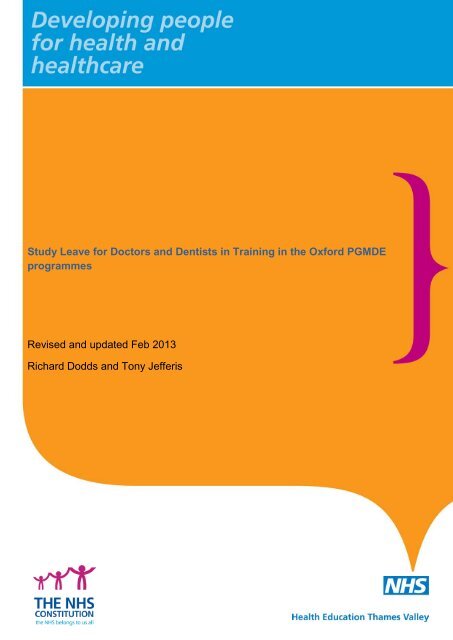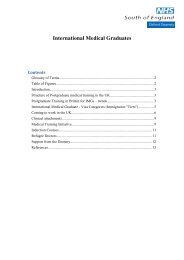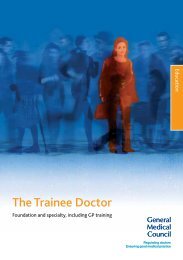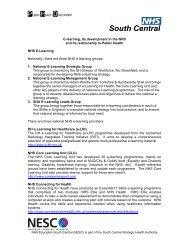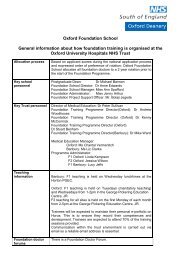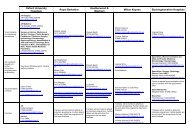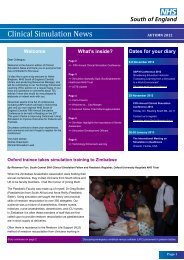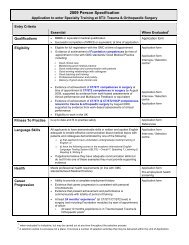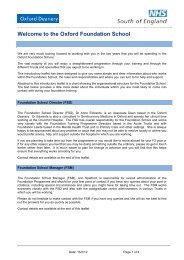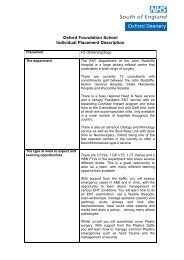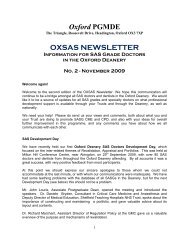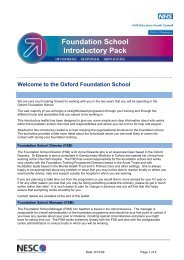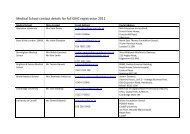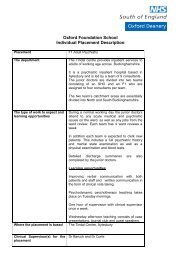Oxford PGMDE Study Leave Policy - Oxford Deanery
Oxford PGMDE Study Leave Policy - Oxford Deanery
Oxford PGMDE Study Leave Policy - Oxford Deanery
You also want an ePaper? Increase the reach of your titles
YUMPU automatically turns print PDFs into web optimized ePapers that Google loves.
1<br />
<strong>Study</strong> <strong>Leave</strong> for Doctors and Dentists in Training in the <strong>Oxford</strong> <strong>PGMDE</strong><br />
programmes<br />
Revised and updated Feb 2013<br />
Richard Dodds and Tony Jefferis
2<br />
Guidelines<br />
The purpose of these guidelines is to ensure that doctors and dentists in <strong>PGMDE</strong><br />
funded training posts have access to a standardised system of study leave. All<br />
applications should be considered fairly, equitably and consistently.<br />
The guidance has been agreed by the Directors of Medical Education (DMEs) of all<br />
the Trusts, the Foundation School Director, the Heads of Schools, the Dental Dean<br />
and the Postgraduate Dean.<br />
All doctors and dentists in educationally approved posts, apart from those in their<br />
first foundation year (FY1), may apply to their employer for study leave.<br />
The Terms and Conditions of Service for Trainees allow up to 30 days per year of<br />
discretionary study leave.<br />
Educational approval for study leave rests with the Trust DMEs collaborating with<br />
educational supervisors, training programme directors and the specialty schools<br />
whilst taking into account service needs within the Trust.<br />
Applications for study leave should be made to the DME, with the approval of the<br />
trainee’s Clinical or Educational Supervisor.. In addition approval may be needed<br />
from the Clinical Director of the unit in which the trainee is working so that the<br />
clinical service is maintained.<br />
Revised and updated Feb 2013<br />
Richard Dodds and Tony Jefferis
3<br />
General Principles for <strong>Study</strong> <strong>Leave</strong> in the <strong>Oxford</strong> <strong>PGMDE</strong> programmes<br />
1. <strong>Study</strong> <strong>Leave</strong> Year<br />
The year’s study leave and its allocated funding should be tailored to the individual<br />
trainee. It will begin on the day of appointment to a programme and not relate to the<br />
fiscal or calendar year.<br />
2. The <strong>Study</strong> <strong>Leave</strong> Week<br />
Time allocated for study leave relates to the number of working days missed over<br />
the leave period. Weekends should only be counted when they coincide with a duty<br />
period.<br />
3. <strong>Study</strong> <strong>Leave</strong> Funds<br />
These are managed by the DMEs, who can only undertake this responsibility<br />
effectively with support from Specialty Training Committee, School Boards and<br />
Educational Supervisors. These funds should not be devolved further within the<br />
Trusts to Directorate or Departmental levels.<br />
The funds are paid monthly by the <strong>PGMDE</strong> to each Trust, the amount being<br />
proportional to their number of eligible training posts.<br />
4. Access to Annual Funding<br />
The trainee is only eligible for a year’s funding in any one year and every application<br />
for funds must be accompanied by a record of the funding he/she has already<br />
received on the programme. Tracking this funding is the responsibility of the trainee<br />
and will be monitored on the “Intrepid Post Management System ®”.<br />
Foundation and Core Trainees may access their funding allocation for the entire<br />
year even though they may be in an individual trust for only six months.<br />
All trainees on <strong>Oxford</strong> <strong>PGMDE</strong> funded training programme may apply for a £600<br />
grant regardless of grade or specialty to support their study leave (except FY1; and<br />
DF1 who must attend their 30 day <strong>Deanery</strong> programme). In common with all grants<br />
at public expense, agreement is needed in advance and detailed receipts are<br />
required to support the eventual payment.<br />
5. Planning<br />
DMEs need to co-ordinate the study leave approval, acknowledging the education<br />
committees' recommendations. Essential, desirable and low priority courses will be<br />
defined by individual specialties. <strong>Study</strong> leave planning should occur within the<br />
context of the entire training programme and not just on an annual basis. The aim is<br />
that there is adequate access to study leave and it is planned
4<br />
Individual trainee’s study leave programme will be reviewed at each RITA / ARCP<br />
panel. Matters arising as a result of the assessment should be communicated to the<br />
trainee and his/her local Specialty Tutor if applicable. The Specialty Tutor should<br />
ensure that the trainee’s Educational Supervisor and DME is told of any problems<br />
6. Booking<br />
At least six weeks’ notice should be provided by the trainee and the local organisers,<br />
the <strong>PGMDE</strong> or specialty training committee. Approval for study leave should only be<br />
given exceptionally if the notice period is shorter.<br />
7. Local Training Programmes<br />
All trainees should attend a relevant local course in preference to equivalent<br />
external courses.<br />
The local or <strong>PGMDE</strong> training programmes run in HE Thames Valley include:<br />
• 15 days per year for FY2, DF2 and Dental Career Development posts<br />
• 20 days for Specialty (inc. LAT, Core and GPVTS whilst in hospital).<br />
A requirement is that the teaching is in protected time and the programme is<br />
published in advance. It is good practice to involve the trainees in planning these<br />
programmes.<br />
Trainees should sign a register confirming attendance at the course, which will be<br />
monitored by the schools, and persistent absence reported to DMEs. It is the<br />
trainee's responsibility to make sure they attend at least 70% of these training<br />
sessions. The sessions should be given approval by DMEs for internal leave for<br />
FY2; DF2 and Core Medical and Dental Care Development Trainees and by<br />
Schools and the <strong>PGMDE</strong> for SpRs/STRs.<br />
Activities such as regular departmental teaching, audit and Clinical Governance are<br />
part of a Trust’s normal activities and are not counted against study leave.<br />
8. Funding for new courses<br />
Schools and Specialty Training Committees wishing to set up new courses can seek<br />
funding by “top-slicing” their trainees' funding equally throughout HE Thames Valley,<br />
provided that this involves a relatively minor proportion of the total allocation, a<br />
majority of trainees consent and it does not unduly disadvantage those that need<br />
funding for other courses.
5<br />
9. Private <strong>Study</strong> <strong>Leave</strong><br />
This will only be granted for a defined purpose such as examination preparation (if<br />
the examination in question is necessary for career progression), writing up<br />
research, writing review papers etc. DMEs will only grant these requests if there are<br />
written objectives agreed between the trainee and their Educational Supervisor<br />
(ES). The ES must agree that the leave is reasonable and appropriate to the context<br />
of the trainee’s overall training and that the service commitment can be covered.<br />
The final approval is with the DME. Afterwards it is good practice to evaluate the<br />
success and usefulness of this study leave. Aims and outcomes must be recorded in<br />
the trainee’s study leave record / portfolio. The general guidance (although<br />
exceptions can be made) is that maximum allocation should only be 5 days in any 6<br />
month period. DMEs should devise systems to monitor that objectives are set.<br />
10. On-Call whilst on <strong>Study</strong> <strong>Leave</strong><br />
Trainees should not do on-call whilst on study leave, even if the period of study<br />
leave is short. Ideally this means not being on call the night before study leave.<br />
Failure to do this reduces the value of study leave to the trainee and is poor value<br />
for money to the <strong>PGMDE</strong>.<br />
11. Locum Cover<br />
<strong>Study</strong> leave funding is allocated for fees and expenses. Locum cover is not part of<br />
this. The need for locum cover should be minimised by good planning. Provided that<br />
adequate notice is given when study leave is agreed, the Trust/Department should<br />
ensure that cover is provided. Locum cover if required needs to be paid for by the<br />
Trust.<br />
12. Learning Agreements, Attendance and Monitoring<br />
All trainees should include a record of their study leave in their portfolio, which they<br />
will be expected to continue throughout their postgraduate career. This record will<br />
cover the aims of the study leave, an evaluation of how well these objectives were<br />
met, as well as informing the learning agreement and future study leave planning.<br />
<strong>Study</strong> leave will not be granted unless the trainee and ES have signed a learning<br />
agreement and the trainee has completed all necessary mandatory training in the<br />
trust in which they work. The DME will need reassurance about this before leave is<br />
granted.<br />
Unless in their first post, a 'Personal <strong>Study</strong> <strong>Leave</strong> Account (PSLA)' is essential to the<br />
study leave application, which shows courses, time and funding granted by the<br />
previous employer(s). This record is completed by the current employing trust, and<br />
stored on the trainees’ computerised training and employment record (Intrepid®)
6<br />
The PSLA should be given to their Educational Supervisor at each new attachment.<br />
13. Evaluation<br />
Trainees should critically evaluate every episode of study leave in terms of its<br />
general quality and its value to them. Most importantly, such critical evaluation,<br />
particularly emphasising what the trainee learnt, should be part of a learning<br />
portfolio.<br />
14. Quality Indicators<br />
Schools running local courses for examination preparation should keep exam<br />
success statistics and any other relevant outcome measure to assure the <strong>Deanery</strong><br />
and DMEs of the quality of their programmes<br />
15. Special Requirements<br />
There are a number of specialties with expensive and time-consuming courses that<br />
are regarded as essential. Funding from the study leave budget will not cover these<br />
and support will need to be found from elsewhere.<br />
16. Trainees at the end of their training<br />
Post- CCT / CCST trainees will continue to be eligible for study leave. The nature of<br />
the study will be different from pre- CCT / CCST in this transition period to a<br />
consultant appointment. Post- CCT / CCST trainees should register with their<br />
College for CPD as soon as they have obtained their CCT / CCST.<br />
17. Less than Full Time Trainees<br />
These have identical needs to those of full-time trainees. However, Specialty<br />
Education Committees and DMEs should be vigilant in ensuring access is the same<br />
as for full time trainees pro-rata.<br />
18. Overseas Graduates<br />
Overseas graduates should have precisely the same opportunities as UK graduates.<br />
However, these trainees may be less familiar with the UK study leave system and<br />
therefore STCs and DMEs should be proactive when it appears such trainees are<br />
not making use of their study leave opportunities.<br />
19. Invitations to Present Papers Abroad<br />
The Postgraduate Deans (COPMeD) guidance states that “attendance may be<br />
possible but costs are likely to be only partially met by the study leave budget”. Care<br />
must be exercised if pharmaceutical company sponsorship is provided. Advice<br />
about its appropriateness must be sought from the DMEs. Departments sending<br />
their trainees on such conferences should be prepared to find alternative sources of<br />
funding.
7<br />
DMEs may wish to seek the views of Specialty Tutors / TPDs on an individual<br />
basis.<br />
20. Trust and Speciality Requirements<br />
Individual trusts, other employers and the trainee’s specialty may have additional<br />
guidelines on the approval and allocation of <strong>Study</strong> <strong>Leave</strong>. It is recommended that<br />
trainees consult these as well as the <strong>PGMDE</strong> Guidelines when they start their posts.<br />
21. Disputes and Appeals<br />
Disputes between trainees and departments should be referred to the DME for<br />
resolution. If no agreement can be reached or if the dispute is with the DME, appeal<br />
to the Dean is the next step. All appeals require written documentation.
8<br />
Guidance for Foundation Year 2 Trainees (FY2s)<br />
<strong>Study</strong> <strong>Leave</strong> should be used to:<br />
• Support the aims of the Foundation Programme<br />
• Achieve the foundation outcomes<br />
• Explore career opportunities and improve wider professional development<br />
FY2s may take up to a maximum of 30 days annual study leave, 15 days of which<br />
should be used to undertake obligatory generic training and the formal foundation<br />
teaching programmes within the Local Education Provider. The remaining 15 days<br />
may be used for study activities outside the Local Education Provider, of these 10<br />
days being available for “taster experiences” in chosen specialties. 5 days of this<br />
may be borrowed from FY2 allocation and taken during FYI year.<br />
A maximum of 5 days of external study leave can be taken in each 4 month<br />
attachment. <strong>Study</strong> leave time may be granted for Foundation Trainees to sit national<br />
examinations but no funding is available for this purpose.<br />
<strong>Study</strong> leave planning should be incorporated in the educational agreement drawn up<br />
between the trainee and his / her Educational Supervisor. These plans should be<br />
revisited at each appraisal. DMEs should monitor these to ensure that such planning<br />
is taking place. Trainees are expected to attend 70% of locally provided training<br />
opportunities.
9<br />
Guidance for Dental Foundation Year 2 Trainees (DF2s) and Dental Career<br />
Development Trainees (CDPs)<br />
<strong>Study</strong> <strong>Leave</strong> should be used to:<br />
• Support the aims of the Foundation Programme<br />
• Achieve the foundation outcomes<br />
• Explore career opportunities and improve wider professional development<br />
DF2s may take up to a maximum of 30 days annual study leave, 15 days of which<br />
should be used to attend the <strong>Deanery</strong> <strong>Study</strong> Programme which is organised by the<br />
DF2 Training Programme Director. 10 of the remaining days may be used for study<br />
activities outside the Local Education Provider, of these 5 days being available for<br />
“taster experiences” in chosen specialties. 5 additional days may be used to attend<br />
obligatory generic training within the Local Education Provider.<br />
A maximum of 5 days of external study leave can be taken in each 6 month<br />
attachment. <strong>Study</strong> leave time may be granted for Foundation Trainees to sit national<br />
examinations but no funding is available for this purpose.<br />
<strong>Study</strong> leave planning should be incorporated in the educational agreement drawn up<br />
between the trainee and his / her Educational Supervisor. These plans should be<br />
revisited at each appraisal. DMEs should monitor these to ensure that such planning<br />
is taking place. Trainees are expected to attend 70% of locally provided (<strong>Deanery</strong><br />
and Local Education Provider) training opportunities.
10<br />
Guidance for Core (CTs) and Specialty Registrars (STRs) / Specialist<br />
Registrars SpRs (including GPVTS when in their hospital posts)<br />
<strong>Study</strong> <strong>Leave</strong> should:<br />
• Enhance learning<br />
• Provide career advancement ( linked to curriculum requirements)<br />
• Be planned as an integral part of a training programme<br />
• Be incorporated in the educational agreement drawn up between the<br />
trainee and their Educational Supervisor<br />
• Provide education and training not otherwise available in the work place<br />
setting<br />
• Include a majority component that is defined as essential for the<br />
specialty or programme, with a proportion remaining for tailoring to<br />
individual needs, where considered integral to the training programme.<br />
Specialty trainees: are entitled to up to a maximum of 30 days <strong>Study</strong> <strong>Leave</strong> per<br />
year. This normally includes 20 days per annum for Locally Provided educational<br />
activity including obligatory training and the core or specialty curriculum teaching<br />
programmes. This includes external university programmes that dental specialty<br />
trainees attend as part of their programme.<br />
This leaves 10 days for discretionary study leave each year adjusted proportionally<br />
for length of attachment. The trainee may apply for 5 days of private study leave in<br />
any 6 month period may be considered leading up to an examination that is<br />
necessary for career progression but this will only be considered prior to the first<br />
occasion that the trainee sits this examination.<br />
The number of days will be entered on the trainee’s record on Intrepid® at source by<br />
the <strong>Deanery</strong>. This will make it clear and simple for each trust to allocate and monitor<br />
the discretionary study leave they control.<br />
Updated by Richard Dodds and Tony Jefferis February 2012


